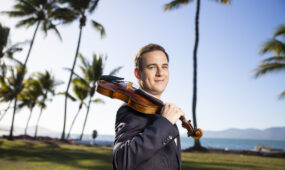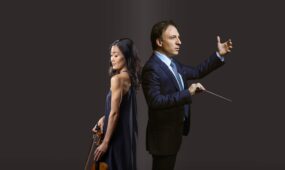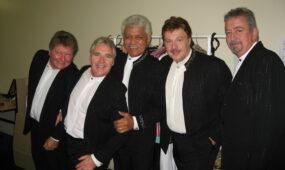‘Music begins where words end’: Meet ASO member Julia Grenfell
Music
Julia Grenfell was 16 when she got her first paid gig with an orchestra, playing a plastic piccolo bought at the last minute just for the occasion. Today, she’s the principal piccolo with the ASO, and giving a solo recital as part of its Virtual Concert Hall.

The ASO’s Julia Grenfell describes music as “what brings colour to the world, transcending boundaries and allowing one to be transported to another place”.
“As the saying goes, music begins where words end – it is somewhat indefinable and that is part of the mystery and wonder of music.”
Born in Malaysia to a Malaysian mum and a Kiwi dad, Grenfell grew up in Christchurch, New Zealand, and knew she wanted to be a musician from the age of nine. However, she wasn’t convinced she would make a career in music until she finally got her job with the Adelaide Symphony Orchestra 19 years ago.
Grenfell – who has science degree in mathematics – is well-travelled, having lived in Sweden for a year and the United States for five years; she studied at universities in New Zealand, Chicago and Houston.
Right now, during the COVID-19 restrictions, she’s finding time to practise in between home schooling her kids and performing for her neighbours from her verandah.
 How did you choose the piccolo?
How did you choose the piccolo?
My best friend in primary school took up the flute, so I chose the same instrument. My sister already played the violin, so I couldn’t do the same as her.
Is there anything special about your actual instrument?
I have one flute and one piccolo as my main instruments and they are both made in Boston, in the US, which is a mecca for flute makers. I did get my piccolo stolen in Sweden last year but thankfully I managed to get it back and it wasn’t damaged. The experience reinforced how much I love it!
Describe the best thing about being a musician:
Where to start?! You get to do what you love, and make a living from it. That doesn’t negate it still being difficult and the labour of a lifetime to play at a high level, but the reward is something that I can’t imagine coming that frequently in other professions. The highs that you get in the job (playing incredible music) are an amazing experience.
Who has influenced you most as a musician?
I’ve had some wonderful teachers influence my playing and life. If I had to choose one it would be my teacher Leone Buyse, who is Professor of Flute at Rice University in Houston. She is still teaching in her 70s and is one of the most all-round inspiring musicians and human beings that I know.
If you could play a different instrument, which would you choose?
Saxophone. Maybe in another life I would like to be a jazz saxophone player…
Which solo or moment in the piccolo orchestral repertoire is your favourite?
There are lots of really fun moments for piccolo. When the orchestra is playing loudly all together and I can try and be the ‘icing on the cake’ at the top end of the sound (high pitch!), that is fun. An example is the fast section in the William Tell Overture.
What is your most memorable performance with the ASO?
When I had the opportunity to play Paul Stanhope’s Piccolo Concerto with the ASO in 2013. That was definitely a highlight for me and I got to be a bit cheeky and play Tico Tico (a lively Brazilian piece) as an encore.
What is your first orchestral concert memory?
I have two memories: as a child I played in my first festival orchestra in Christchurch (it was made out of secondary school children). I don’t remember the repertoire but I do remember the absolute thrill of the experience – all these kids playing together in a huge group on stage.
Then, when I was 16, I played my first concert with the Christchurch Symphony Orchestra. I couldn’t believe I was in my first ever gig (where I actually got paid!) but, significantly, I remember being put on piccolo (probably not a wise idea) and I didn’t even own one, so my parents hurriedly bought me a $300 plastic piccolo, which I still own to this day. I do remember one piece from that program, Tchaikovsky’s Romeo and Juliet Overture. That experience also was completely thrilling, reinforcing my dream to be in a professional orchestra one day.
COVID-19 has put a hold over ASO concerts for the time being. What do you miss the most about not being able to perform?
Everything! I am quite bereft about not playing regularly in an orchestra at the moment; it’s something I seem to have done my whole life and it’s what I love to do. Just making that amazing sound all together; it simply isn’t the same practising on your own.
How many hours a day are you practising to stay playing fit for when concerts resume, and where in the house do you practise?
I do what I can with practise, in between home schooling my kids. I’m lucky I have my own study where I practise and can teach. At the moment I am just doing studies and solo pieces. I did play a little concert for my neighbours on the verandah recently and played some French solo pieces, some well known short tunes, and a piece by my sister.
What is the thing you most crave while living in isolation?
Playing in an orchestra! And some peace and quiet at home with the house to myself and the ability to focus on my practise.
When you’re not performing or practising, what do you enjoy doing in your free time?
A lot of time is taken up with the domesticities of a young family, but if I have any time and energy left I like to go for walks or catch up with friends, or just watch a movie or TV series with my husband for some down time. We also like camping as a family.

Julia Grenfell with her daughter at Henley Beach.
When I’m not listening to classical music, what do you listen to?
I like Sting, the Beatles, David Bowie, Billy Joel, Cat Empire, Ella Fitzgerald, Adelaide band Marmalade Circus… and anything by Neil Finn. Genre-wise, jazz is my favourite.
Name three pieces of music you love, and why?
Stravinsky’s Rite of Spring. It’s totally mind-blowing and quite primal. I love his harmonic and rhythmic language and it’s just remarkable for its time.
Rachmaninov’s Symphonic Dances. His lush Romantic melodies and harmonies are gorgeous, and although the piano concertos are fantastic, this work really showcases the orchestra.
Prokofiev’s Symphony No. 5. My favourite composer used to be Stravinsky but Prokofiev has in recent years come up to rival that. I absolutely love the clarity of his writing, the quirkiness, the great instrumentation, and the soaring melodies.
I admit I’m a fan of Russian composers!
What piece of music never fails to move you?
Probably some of the moments in Mahler symphonies that are just sublime and transcendent. The Adagietto from Symphony No. 5, which we were supposed to perform on March 14 and 15 with Adelaide Festival, is case in point.
Do you come from a musical family?
My parents both grew up in households that loved music a lot, particularly my mother who had an uncle who was a percussionist in a Latin band in London in the ’60s. Mum and Dad both learned piano as children. I have one sister (Maria Grenfell) who is a composer and her work has been performed by most of the Australian orchestras (including ASO); she is an Associate Professor at the Conservatorium of Music in Hobart.
What’s your idea of a perfect day in Adelaide?
The perfect summer’s day is going for a walk and maybe yum cha with some friends, and then a later afternoon swim (and maybe kayak paddle) at Henley or Grange, followed by fish and chips at the beach.
If you could ask one composer one question what would it be?
Beethoven – how on earth did you write the incredible music you did, given your hearing, your health and your difficulties?
Julia Grenfell is performing Marin Marais’ Les Folies d’Espagne as part of the ASO’s Virtual Concert Hall, a series of online recitals being presented while live performances are on hold due to COVID-19 restrictions. The video will be available to view from May 9-16.
Support local arts journalism
Your support will help us continue the important work of InReview in publishing free professional journalism that celebrates, interrogates and amplifies arts and culture in South Australia.
Donate Here




